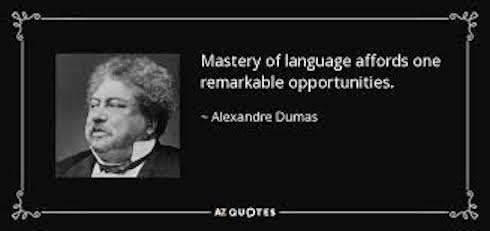
The Sounds Of a Language are Just PART of the Story
Speaking another language fluently is challenging. Producing foreign speech sounds in new and unfamiliar patterns is demanding, to say the least.
But the speech sounds themselves are just one part of the big picture. Our native language and speech patterns are deeply ingrained, and it takes more than some regular "English lessons" to learn and establish new ways of feeling, thinking, and being while communicating.
Every language has its own "music." Embedded in this music is a distinct rhythm, flow, and character. In some ways, the music and flow of a language goes even deeper than the speech sounds. Speaking a language with the correct speech sounds but with the wrong music is like dancing a Waltz to a Salsa beat. The steps might be right (box step, for all you ballroom dancers!) but the essence of the dance is... lost in translation.
A classical musician can learn how to play their cello with a jazz style. A Chinese, Spanish, French... person can learn how to play their instrument in an English style, if they want.
Intonation, stress, phrasing, prosody... these are all critical aspects of spoken language, and speaking English is just not the same when sung in a different style. The mouth feel and voice placement also need to shift when we play this instrument in a different style, so we will address those aspects, as well!
Speaking is singing with just less exaggerated dynamics. When we sing, we use our brains in such a way that the left side ( the analytical and logical side) and the right side ( music, space, creativity, and intuition) are combined. When you use this approach to language and accent, you are literally using more of your brain and making important neural connections. I'll speak more on this in our time together.

Dumas knew what he was talking about!
In this 1 hour-long online class, we're going to talk about... music! ;) The music of English, that is, and how we play it with our bodies, mouths, and minds. It's a holistic approach to speaking a language that can lead to a more embodied, natural, comfortable feeling while communicating.
When you understand and practice this approach, you will benefit in multiple ways. You'll start to feel a more organic connection to your body and breath when you speak, and your language begins to flow more seamlessly. Your English speaking will become more natural sounding and more fluent, but also clearer, more dynamic, resonant, interesting, and confident sounding. That's a lot of benefits!
This is the stuff you're just not typically taught in an English class, but can transform how you sound and feel when you speak.
You might just find yourself speaking up more in meetings, conversing more easily with strangers, and just going about your daily life, knowing you've got what it takes to connect easily, comfortably, and confidently with whatever comes your way.
Schedule a free consultation here.
